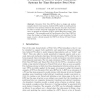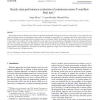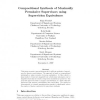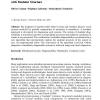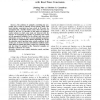156
click to vote
ICINCO
2009
14 years 12 months ago
2009
This paper serves as a support for the plenary address given by the second author during the conference. In this paper we present an approach to on-line diagnosis of discrete even...
120
click to vote
TOPNOC
2008
15 years 2 months ago
2008
Recursive Petri Nets (RPNs) allow to design and analyze complex discrete event systems. Indeed, RPNs enable to model patterns of discrete event systems related to the dynamic struc...
131
click to vote
AUTOMATICA
2005
15 years 2 months ago
2005
The number of states in discrete event systems can increase exponentially with respect to the size of the system. A way to face this state explosion problem consists of relaxing t...
164
click to vote
TASE
2008
IEEE
15 years 2 months ago
2008
IEEE
In this paper we deal with the problem of modeling railway networks with Petri nets so as to apply the theory of supervisory control for discrete event systems to automatically de...
117
click to vote
DEDS
2007
15 years 2 months ago
2007
This paper presents a general framework for efficient synthesis of supervisors for discrete event systems. The approach is based on compositional minimisation, using concepts of p...
110
click to vote
DEDS
2007
15 years 2 months ago
2007
Decentralized diagnosis of discrete event systems has received a lot of attention to deal with distributed systems or with systems that may be too large to be diagnosed by one cen...
120
click to vote
IJFCS
2006
15 years 2 months ago
2006
This paper studies conflicts from a process-algebraic point of view and shows how they are related to the testing theory of fair testing. Conflicts have been introduced in the con...
119
click to vote
DEDS
2006
15 years 2 months ago
2006
The diagnosis of unobservable faults in large and complex discrete event systems modeled by parallel composition of automata is considered. A modular approach is developed for diag...
121
click to vote
DEDS
2010
15 years 2 months ago
2010
In discrete event systems, a given task can start executing when all the required input data are available. The required input data for a given task may change along the evolution...
131
click to vote
DEDS
2010
15 years 2 months ago
2010
Abstract-- The problem of optimally controlling the processing rate of tasks in Discrete Event Systems (DES) with hard real-time constraints has been solved in [9] under the assump...

